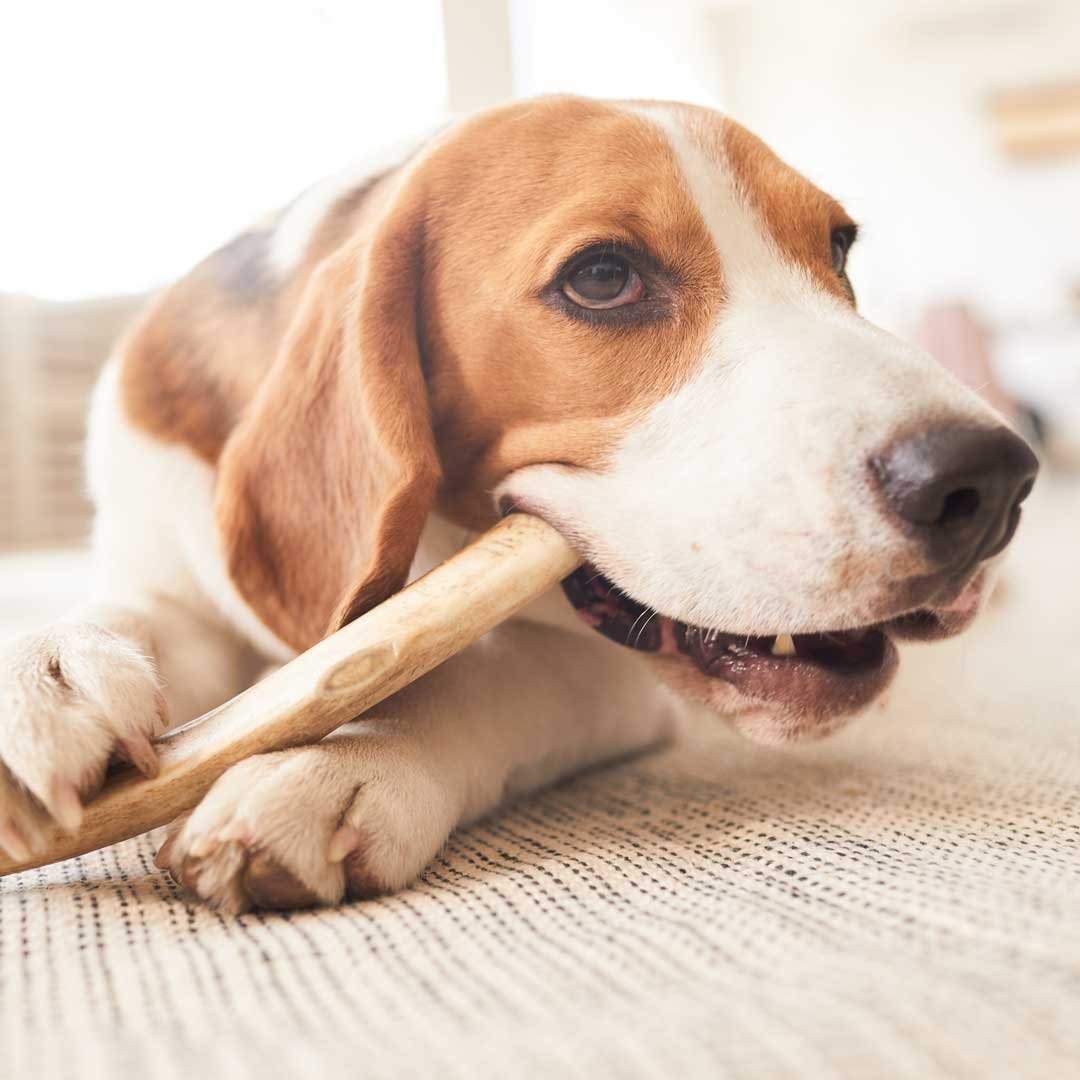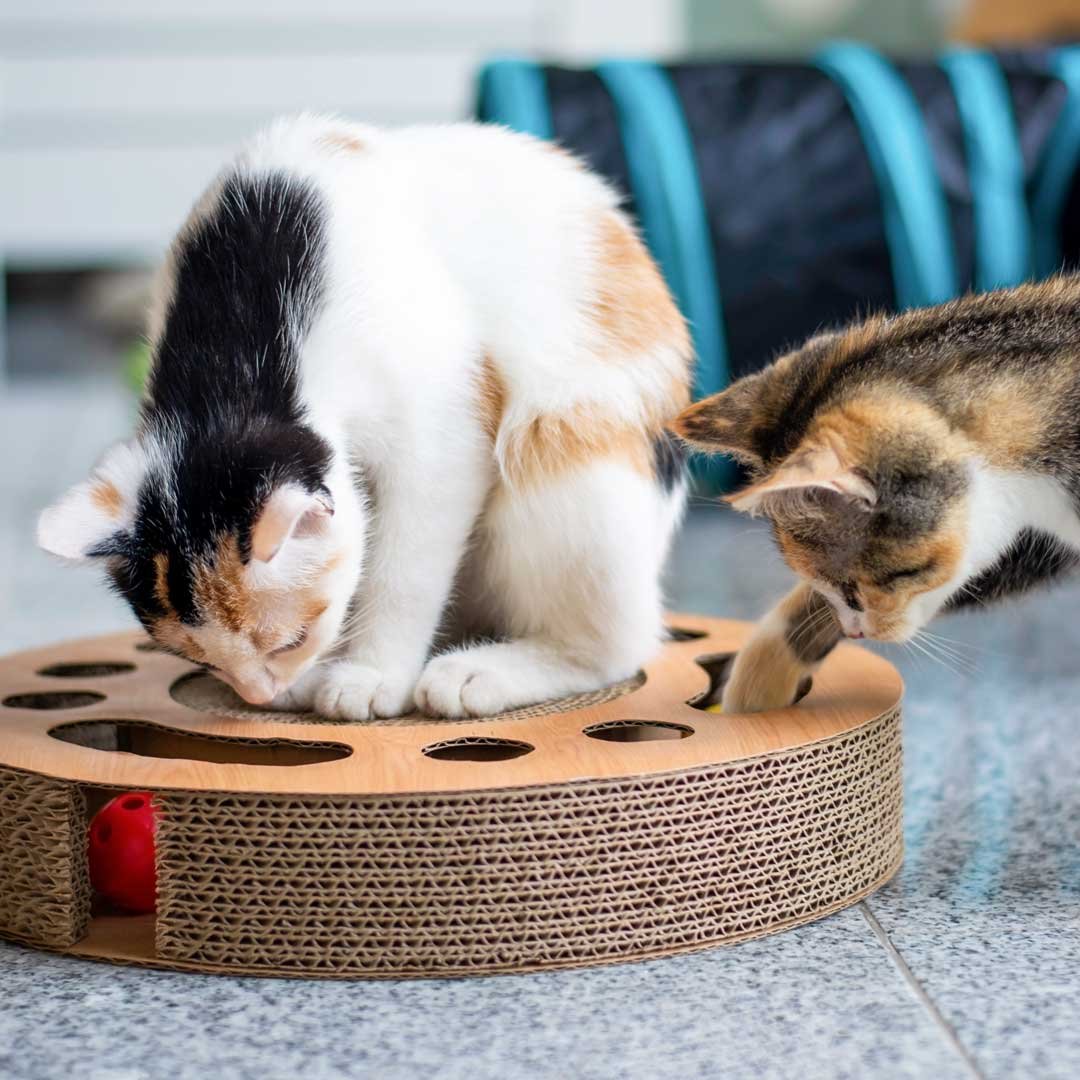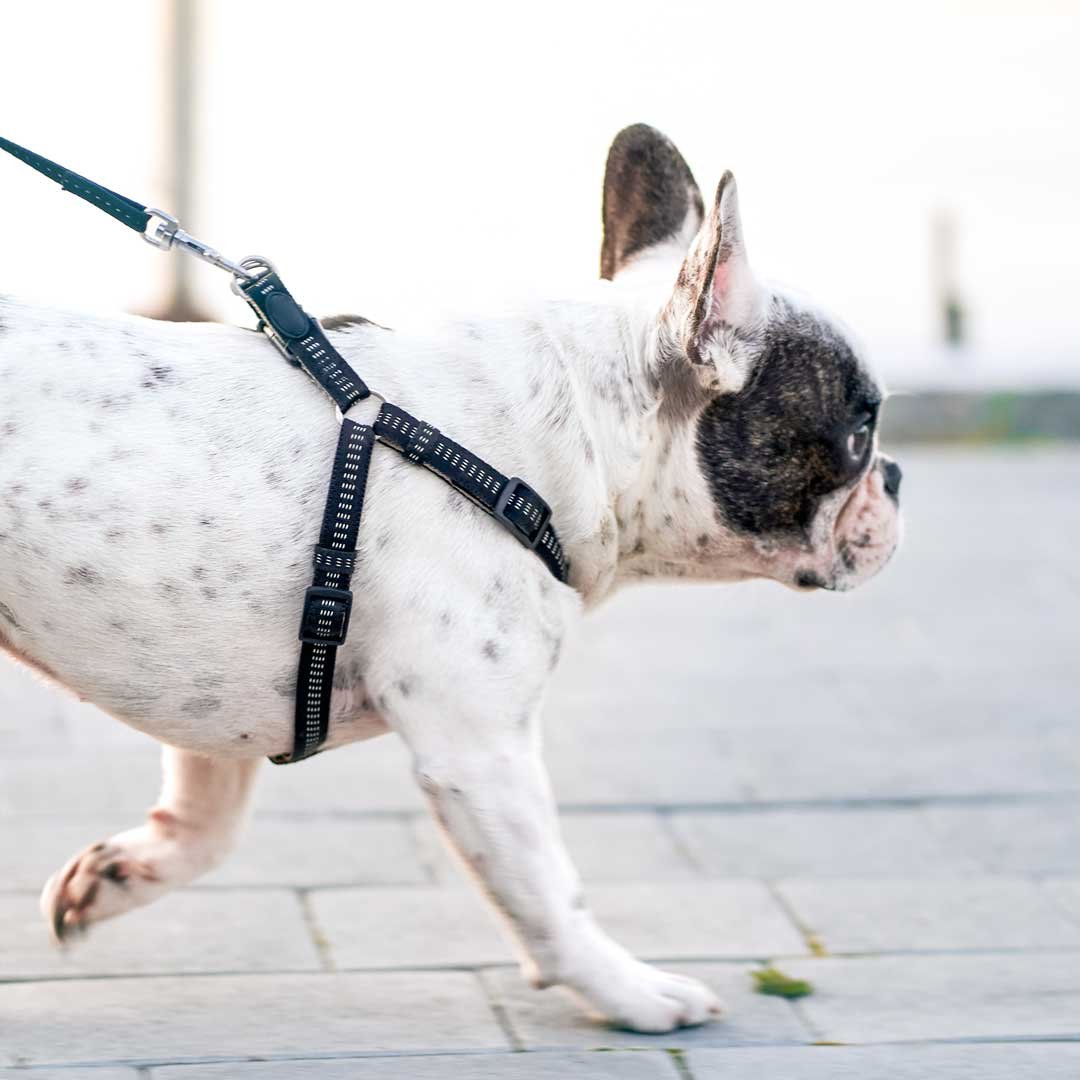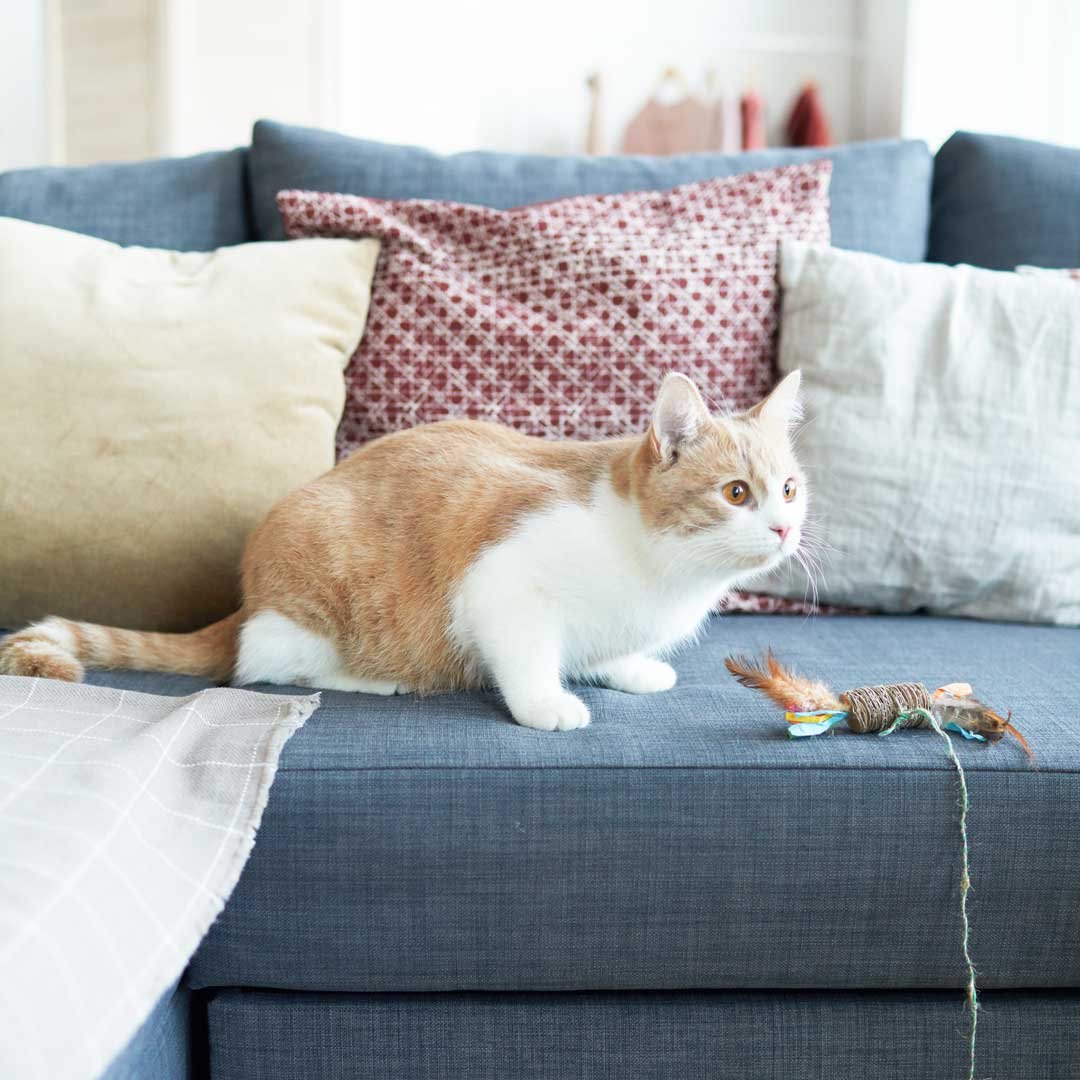Dogs are five times more likely to have gum disease than humans. This shows how crucial dental care is for our pets. They need more than just walks and playtime for good health. A full-care approach is necessary.
Key Takeaways
- Annual wellness visits to your veterinarian are crucial for monitoring your dog’s health.
- Maintaining a balanced diet and appropriate exercise routine helps prevent obesity in dogs.
- Regular grooming, including coat brushing, nail trimming, and teeth brushing, contributes to your dog’s overall well-being.
- Parasite prevention through monthly medications and deworming is essential to protect your dog from serious diseases.
- Socialization and positive reinforcement training promote good behavior and confidence in dogs.
Being responsible for your dog’s health means focusing on nutrition, exercise, grooming, and more. With expert advice, your pet can live a long, happy life. You play a huge role in this!
Regular Veterinary Check-ups
It’s key to take your dog for a vet visit each year. This helps keep your dog in top health and fitness. Your vet can find and stop issues early, keeping your furry friend healthy. They’ll check your dog’s body and recommend the best dog nutrition, exercise routines, grooming tips, and preventive care.
Importance of Annual Wellness Visits
Just as people need check-ups, dogs do, too. These yearly visits catch and solve health worries quickly. Vets look at your dog’s growth and health to know if anything needs fixing fast.
If problems are found early, they’re easier to treat. This helps stop your dog from getting too fat or sick later on.
Vaccinations and Preventative Care
Your vet will update your dog’s shots during these check-ups. This protects against several diseases. They also give advice on flea, tick, and worm prevention.
Getting your dog fixed is also important. It helps keep them healthy and less likely to run away. Your vet can talk to you about the best time and way to do it.
| Age Group | Dental Care Importance |
|---|---|
| Puppies and Young Dogs | Establish good dental habits early on to prevent future issues. |
| Adult Dogs | Regular dental cleanings and at-home care to maintain oral health. |
| Senior Dogs | Crucial for preventing dental disease and potential internal organ complications. |
Keeping your dog’s teeth in good shape is important. The chart above shows how caring for their teeth changes with age. Starting good habits early and keeping them up can prevent many dental problems.
These yearly visits are also a time to talk about any issues like barking too much. Your vet can help with training and ways to make sure your dog is happy and gets along well at home and in the community.
Proper Nutrition and Hydration
A balanced diet is key to your dog’s health. A dog nutrition strategy designed for them leads to the best growth and energy. It’s all about choosing what’s right for their age, size, and how active they are.
Balanced and Appropriate Diet
Dogs need a mix of foods to stay healthy. This includes meat, fats, carbs, and vitamins. The AAFCO gives standards for what’s in dog food. It’s smart to pick foods from trusted brands that use quality ingredients.
Monitoring Food Intake and Weight
Keeping your dog at a healthy weight prevents problems. Watch what they eat and check their weight often. You can easily adjust how much they eat by considering their age and how much they move. Using a simple formula helps figure out how many calories they need each day.
Fresh and Clean Water Access
Water is as vital for dogs as it is for us. Make sure they always have a full, clean water bowl. Enough water helps with digestion, staying cool, and getting rid of waste.
Always look to your vet for diet advice tailored to your dog. Regular visits ensure your dog’s diet matches their specific needs. This attention to diet keeps your dog healthy and content for many years.
Daily Exercise and Activity
Keeping your dog active is key to their health and fitness. Exercise manages their weight and builds muscles. It also fights boredom and keeps their mind healthy.
Walking, Running, and Playtime
Regular walks or runs are great for dogs. They burn calories, make muscles stronger, and prevent obesity. Playing fetch or just running in the yard is also good. Most dogs need at least one or two walks each day for their well-being.
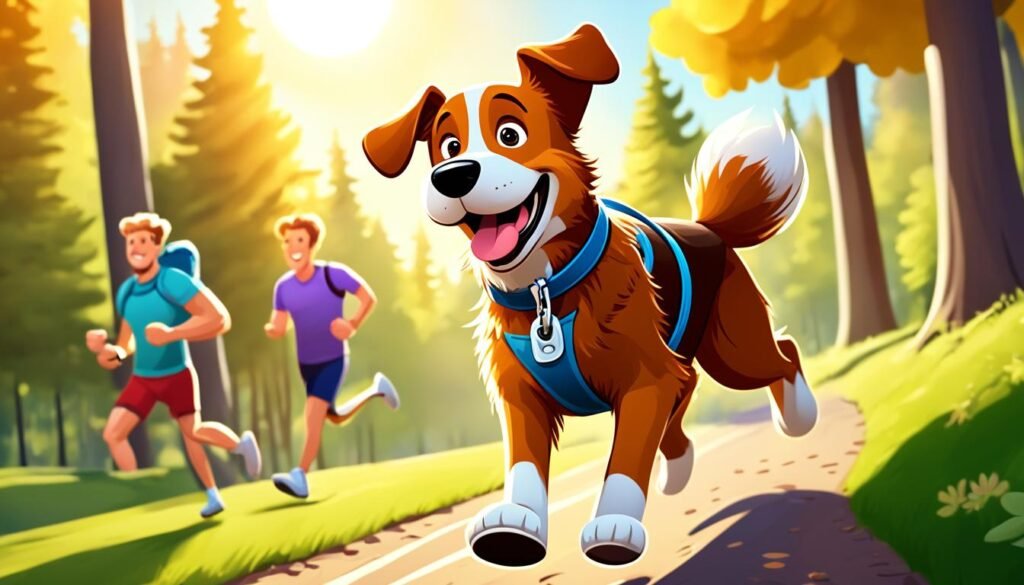
Engaging in Dog Sports and Activities
Try fun things like agility, flyball, or scent work for mental and physical exercise. These keep dogs happy and stop them from getting bored. Every dog is different; some like to fetch, swim, or hike. Pick activities that your dog enjoys and that you can do consistently.
Dogs struggling with fitness may need adjustments in their diet and exercise routine, which can be recommended by a veterinarian.
When planning exercise for your dog, think about their age, health, likes, and what they can handle. Your vet can help make a custom plan that considers their unique needs. This is important for dogs with health conditions like issues with their metabolism or heart.
| Breed Type | Recommended Daily Exercise |
|---|---|
| Herding Dogs | Up to 2 hours, divided into two sessions |
| Terriers | At least 60 minutes |
| Toy Breeds | 30-60 minutes, with attention to potential for obesity |
| Short-Snouted Breeds | Cardiovascular conditioning tailored to their respiratory needs |
Remember, slowly increasing exercise is better than intense workouts. It helps prevent injuries and keeps your dog fit. Make a plan that helps your dog get stronger over time.
Grooming and Dental Care
Grooming and dental care are key to your dog’s health. By brushing, trimming nails, and cleaning teeth, you prevent serious health problems. These tips help your dog stay happy and healthy.
Regular Brushing and Coat Maintenance
Brushing your dog’s coat helps prevent matting and removes loose hair. It also keeps their skin healthy by spreading natural oils. You should check your pet’s skin for any problems.
The brushing frequency depends on your dog’s breed and coat. Bathe and trim your dog to keep their coat in top shape.
Nail Trimming
Overgrown nails can hurt your dog, leading to painful conditions. It’s important to trim their nails often. The timing of nail trims varies but aiming for every 4-6 weeks is good.
If you’re not sure how to trim nails, ask a professional. They’ll show you how or do it for you.
Teeth Brushing and Professional Dental Cleaning
Many people overlook dental care, yet it’s vital to prevent gum disease and other issues. Most dogs have gum problems by age 3. Regular tooth brushing and professional cleanings help your dog’s teeth stay healthy.
There are many tools and products for dog dental health:
- Dental wipes can help remove plaque and freshen breath when brushing is not possible.
- Dental treats and chews are designed to scrape off plaque and promote healthy gums.
- Professional cleanings by your veterinarian are often the most effective way to maintain optimal dental hygiene for your dog.
By adding these care habits to your routine, you help your dog be their best. Plus, you catch health problems early, before they get too serious.
Maintaining a Healthy Weight
It’s vital to keep your furry friend at a healthy weight. This helps avoid obesity and its health problems. The Association for Pet Obesity Prevention says 56% of dogs are overweight. So, it’s important to keep your dog fit and trim.
Monitoring and Preventing Obesity
If your dog is overweight, they need to lose some pounds. Obesity can cause many health issues. You should limit treats and watch their portion sizes. Regular exercise is also key. This includes games like fetch, walks, or trips to the park. These activities can help manage your dog’s weight.
After losing weight, keep up the good work. Many dogs gain weight back if their routine slackens. So, it’s key to always watch what they eat and their exercise.
Obesity-Related Health Issues
Dog obesity is a big problem, causing health troubles similar to humans. Extra pounds can lead to heart and joint problems. It can also shorten your dog’s life. Remember, exercise needs might differ for various dog breeds. Always get advice from your vet on the right activities to keep them healthy.
Can dogs beg just for fun or because they’re really hungry? Feeding your dog a high-protein diet with fibers may help manage their hunger. This also helps avoid overeating.
| Weight Management Strategies | Recommendations |
|---|---|
| Diet |
|
| Exercise |
|
| Portion Control |
|
| Consistency | Maintain a consistent diet and weight-loss efforts |
Proper nutrition and exercise are key to a dog’s health. By working with your vet, you can avoid many health problems. These include heart and joint issues. Ensure your dog has a long, happy, and active life.
Parasite Prevention and Control
Keeping your dog healthy means preventing parasites. This includes fleas, ticks, and worms that can harm your dog. It’s important to give them flea, tick, heartworm, and deworming medications. Your vet will advise on the best schedule. These medications help keep your pet fit and avoid dog obesity.
Flea, Tick, and Worm Prevention
Fleas, ticks, and worms spread diseases and make dogs sick. Always check your dog after being outside. This helps find and remove any parasites. Ask your vet for advice on preventive care. They can suggest the best products to keep your dog healthy.
Regular Deworming and Pest Treatment
Along with monthly prevention, deworming is key. Your vet will suggest a deworming plan. This depends on your dog’s age and risk factors. Quickly treating any parasites found is important. It keeps your dog healthy and fit.
Make parasite control a top priority. It protects your furry friend from health problems. This way, they can be happy and full of energy for a long time.
| Parasite | Prevention Method | Potential Health Risks |
|---|---|---|
| Fleas | Topical or oral medication | Skin irritation, anemia, tapeworm transmission |
| Ticks | Topical or oral medication | Lyme disease, Rocky Mountain spotted fever |
| Heartworms | Monthly preventative medication | Heart and lung damage, potential mortality |
| Intestinal Worms | Deworming medication | Weight loss, digestive issues, malnutrition |
Environmental Safety and Enrichment
Creating a safe and fun environment is key for your dog’s happiness. You can do this by using interactive toys, puzzle feeders, and training. These activities not only prevent boredom and bad habits but also keep your dog physically active. It’s also important to ensure your home and yard are safe for your pet. This means getting rid of any dangerous items or chemicals.
Pet-Proofing Your Home and Yard
Keeping your dog safe at home starts with pet-proofing your space. It’s essential to remove any items that could harm your pet. By doing this, you not only prevent dog obesity but also ensure they are safe. Responsible pet owners always prioritize their pet’s safety.
- Store household cleaners, medications, and chemicals securely out of reach.
- Cover electrical cords and outlets to prevent chewing or electrocution.
- Secure trash cans with lids to prevent access to potentially harmful items.
- Remove poisonous plants from your yard and garden areas.
- Fence your yard or use a secure leash to prevent your dog from wandering off.
Providing Mental Stimulation and Toys
Keeping your dog mentally sharp is as crucial as physical exercise. You should use interactive toys and puzzle feeders. These, along with training sessions, can prevent boredom and destructive behavior. They also improve your dog’s thinking skills.
| Activity | Benefits |
|---|---|
| Puzzle Feeders | Slows down eating pace, promotes healthy digestion |
| Treat-Dispensing Toys | Keeps dogs mentally engaged and focused |
| Rotating Toy Selection | Maintains interest and prevents boredom |
| Training Sessions | Reinforces obedience and builds a strong bond |
Always switch and add new toys to keep your dog interested. It’s also good to change up sounds, smells, and textures around them. This keeps their environment interesting and helps their senses grow.
Socialization and Training
Training your dog and getting them used to new things helps keep them healthy. When they learn how to behave, they stay fit, think more, and feel good.
Positive Reinforcement Training
Positive reinforcement means rewarding good behavior. Use treats, praise, or playtime. Keep training sessions short, no longer than 10 minutes, to keep it effective.
Teaching your dog tricks is a good way to strengthen your bond. It keeps them physically and mentally active. Tricks like “roll over” or “shake” are great for this.
Introducing to Other Dogs and People
It’s important to help your dog feel comfortable around others. Start slowly, introducing them to different people and dogs. Places like training classes or dog parks are good for this.
Dogs that are social and well-trained are safer and happier. Socializing and training from early on is key. It helps them lead a healthy and joyful life.
| Exercise | Benefits |
|---|---|
| Fetch | Engages body and mind, improves running and jumping |
| Tug of War | Strengthens jaw muscles, neck, and shoulders |
| Frisbee | Enhances agility and coordination, bonding activity |
| Agility | Builds strength, coordination, and weight management |
| Swimming | Low-impact, full-body workout, and mental stimulation |
Exercises like fetch and swimming offer great benefits for dogs. Mixing these activities keeps them well both physically and mentally.
Age-Specific Care
A dog’s needs change as they grow, from baby to old age. It is key to care for them according to their age. This ensures they stay well and active.
Puppy Care and Development
Young puppies need lots of love and attention to grow right. Help them learn at a young age. Here’s what they need:
- Socialization with people and other animals to build confidence
- Consistent house training and obedience training
- Age-appropriate exercise and playtime for physical and mental stimulation
- Nutritious puppy-formulated diet for growth and energy
- Timely vaccinations and deworming as per your vet’s schedule
Focusing on good puppy care means they’ll likely be happy and healthy adults.
Senior Dog Care and Considerations
When dogs grow very old, they need special care. Tailor their care to help with old-age changes, such as:
- Modified diet with senior-friendly formulas and potential supplements like glucosamine and omega-3s
- Adjusted exercise routine with lower-impact activities and shorter durations
- Regular grooming with extra care for arthritis or mobility issues
- Environmental modifications like orthopedic bedding, ramps, and elevated food and water bowls
- Increased veterinary visits for routine check-ups and monitoring of age-related conditions
Providing special care helps deal with common old dog issues. This includes achy joints, memory loss, and staying a healthy weight.
| Puppy Care | Senior Dog Care |
|---|---|
| Socialization | Environmental modifications |
| House training | Diet adjustments |
| Obedience training | Exercise routine adjustments |
| Vaccinations | Increased vet visits |
| Puppy-formulated diet | Potential supplements |
Talk to your vet to make a perfect care plan for your dog’s whole life. A plan that meets all their needs will keep them healthy and happy.
Supplementation and Preventive Care
Maintaining your dog’s health goes beyond proper nutrition and exercise. Adding preventive care and supplements are key. It is crucial to talk to your vet. This ensures you choose the best for your dog, considering factors like age and breed.
Supplements benefit different dogs in various ways. Senior dogs might need joint supplements. These help with mobility. Puppies, on the other hand, might benefit from probiotics. This will keep their digestion healthy.
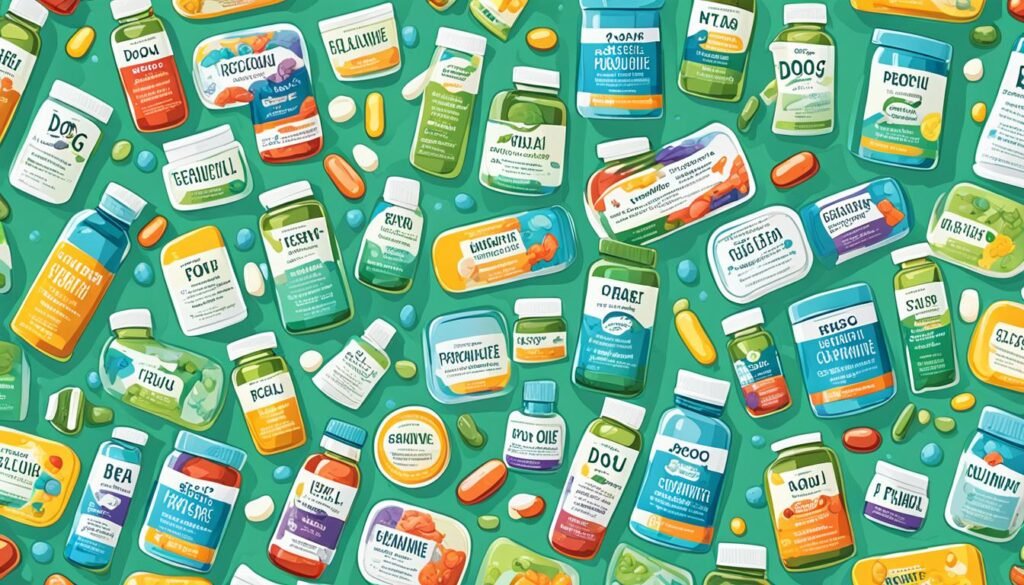
On top of supplements, preventive care is vital. It helps find and treat health issues early. Ensure your dog gets regular check-ups, clean teeth, and controls parasites. This keeps them well and stops issues from getting worse.
| Preventive Care | Purpose | Frequency |
|---|---|---|
| Veterinary Check-ups | Monitor overall health | Annually |
| Dental Cleanings | Prevent gum disease and tooth decay | As recommended by vet |
| Parasite Control | Protect against fleas, ticks, and worms | Monthly or as prescribed |
| Vaccinations | Prevent life-threatening diseases | Puppy schedule, then annual or tri-annual boosters |
By using the right supplements and staying on top of preventive care, you can ensure your dog’s health and long life. Your vet can help you create a plan tailored to your dog. This will keep them joyful, healthy, and vigorous.
Conclusion
To keep your dog healthy and fit, use a complete strategy. This includes regular vet visits, a good diet, exercise, and mental challenges. Also, keep up with grooming, protect them from parasites, and make sure they’re safe and happy at home. Socialize your dog, teach them, and consider their age in all these steps. Aim to prevent obesity by nutrition and lots of exercise. Remember, these tips are essential for your dog’s happiness and health.
Make daily habits that promote your dog’s well-being. For grooming, focus on brushing, nail care, and cleaning their teeth, so they look and feel good. Walk, run, or play exercises that suit their age and breed. Keep their mind sharp with toys and games. For older dogs, special care and supplements help. With a tailored approach, your dog can lead a long, fulfilling life beside you.
Caring for your dog involves more than just physical health. It’s about their diet, grooming, and keeping them safe from illnesses. Also, about making sure they’re happy and engaged, no matter their age. With the right environment and care, you build a strong bond with your pet. This will bring you joy and precious moments for many years.
FAQ
Why are annual wellness visits to the veterinarian important?
What kind of diet should I feed my dog?
How much exercise does my dog need?
Why is grooming and dental care important for my dog?
How can I prevent obesity in my dog?
How do I protect my dog from parasites?
How can I keep my home safe and enriched for my dog?
Why is socialization and training important for my dog?
What are some age-specific care considerations for puppies and senior dogs?
Should I give my dog supplements or preventive care?
Source Links
- https://www.akc.org/expert-advice/health/how-to-keep-your-dog-healthy/
- https://www.thekennelclub.org.uk/health-and-dog-care/health/health-and-care/a-z-of-health-and-care-issues/10-ways-to-help-keep-your-dog-healthy/
- https://www.akcchf.org/canine-health/your-dogs-health/10-tips-to-keep-your-dog-healthy.html
- https://www.purina-arabia.com/articles/dogs/health/daily-care/vet-check-ups-for-dogs
- https://www.purina.co.uk/articles/dogs/health/daily-care/vet-check-ups-for-dogs
- https://www.rspcapetinsurance.org.au/pet-care/dog-care/what-should-feed-dog
- https://vcahospitals.com/know-your-pet/nutrition-general-feeding-guidelines-for-dogs
- https://www.aspcapetinsurance.com/resources/how-much-exercise-does-my-dog-need/
- https://www.pdsa.org.uk/pet-help-and-advice/looking-after-your-pet/puppies-dogs/how-much-exercise-does-your-dog-need
- https://vcahospitals.com/know-your-pet/healthy-exercise-for-dogs
- https://collegehillsvet.com/10-proven-ways-to-keep-your-pet-healthy/
- https://www.akc.org/expert-advice/health/keep-dog-teeth-clean/
- https://www.azcaninerehab.com/blog/how-to-maintain-a-healthy-weight-for-your-dog
- https://www.akc.org/expert-advice/nutrition/8-ways-to-help-your-overweight-dog/
- https://www.webmd.com/pets/dogs/healthy-safe-dog-vet-advice
- https://www.gogostik.com/blogs/news/enhancing-your-dogs-life-wellness-and-enrichment-strategies
- https://www.barkandwhiskers.com/2023-11-13-environmental-enrichment/
- https://www.iwdba.org/working-dog-resources/what-is-environmental-enrichment/
- https://www.centralbarkusa.com/blog/tips-to-keep-your-dog-fit-during-national-canine-fitness-month/
- https://ruffacademywi.com/canine-fitness-training-keeping-your-dog-healthy-and-happy/
- https://wyomingk9trainingacademy.com/the-benefits-of-socialization-and-training-for-your-dog/
- https://www.smalldoorvet.com/learning-center/seniors/keep-senior-dog-healthy/
- https://www.naturopetfoods.com/blog/advice/canine-fitness-month-tips-and-tricks-for-keeping-your-dog-healthy-and-active
- https://www.pettraveladvisor.com/keep-your-dog-fit-and-healthy/
- https://pinecreekah.com/blog/keeping-your-furry-friends-fit-a-guide-to-preventing-pet-obesity


